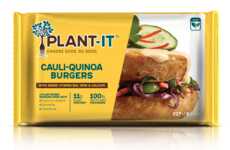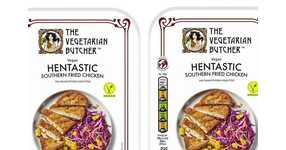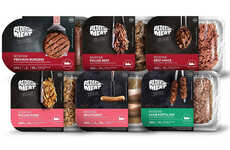
Abbot's Butcher Makes "Chorizo," "Chicken" and "Beef"
Laura McQuarrie — November 13, 2019 — Lifestyle
References: abbotsbutcher & fabnews.live
Many plant-based meats on the market are branded in a way that appeals to vegetarians and vegans with green colors and a lack of animal imagery but Abbot's Butcher introduces meatless products that are packaged more like traditional meat products. The products boast dark, premium packages that are designed to entice the average consumer to try something outside of their comfort zone and experiment with flexitarianism.
The brand's slow roast "chicken," Spanish smoked "chorizo" and umami ground "beef" products are each identified by a colorful woodcut-style illustration, as well as labels that spell out the plant-based protein content of the products, and their soy-free and non-GMO formulas, some of which are also oil-free and gluten-free.
Image Credit: Hunger Craft, Abbot's Butcher
The brand's slow roast "chicken," Spanish smoked "chorizo" and umami ground "beef" products are each identified by a colorful woodcut-style illustration, as well as labels that spell out the plant-based protein content of the products, and their soy-free and non-GMO formulas, some of which are also oil-free and gluten-free.
Image Credit: Hunger Craft, Abbot's Butcher
Trend Themes
1. Butcher-inspired Plant-based Meats - The trend for more meat-like vegetarian and vegan options, packaged and branded to look like traditional meats, presents an opportunity for innovation in the plant-based meat industry.
2. Flexitarianism - The rise of flexitarianism, where consumers choose to eat less meat and more plant-based proteins, creates a need for more diverse and tasty plant-based options, such as those offered by Abbot's Butcher.
3. Transparency in Labeling - Demand for transparency in labeling, including information on plant-based protein content, soy-free and non-GMO formulas, as well as oil-free and gluten-free options, is driving innovation in the plant-based meat industry.
Industry Implications
1. Plant-based Meat - The plant-based meat industry has an opportunity to expand its product offerings by creating more meat-like options that appeal to flexitarians and meat-eaters, while providing transparent labeling that highlights ingredients, nutrition facts, and other key information.
2. Food Packaging - Innovations in food packaging, such as premium, dark, and woodcut-style designs, can help plant-based meat companies stand out on store shelves and attract new customers.
3. Sustainable Food Production - As consumers seek out more sustainable food options, the plant-based meat industry can continue to grow by developing more environmentally friendly products that address concerns around animal welfare, climate change, and health.
2.2
Score
Popularity
Activity
Freshness























